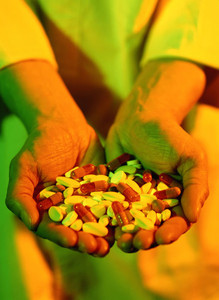Competition usually keeps the price of generics well below that of brand-name drugs. However, when there is little or no competition, generics makers can substantially increase prices, which may lead to drug shortages. One way to address such market failures could be to introduce a non-profit generics maker to the market, according to researchers from Intermountain Healthcare, the Johns Hopkins Carey Business School and the Johns Hopkins Bloomberg School of Public Health [1].
A US-based retrospective cohort study found that generics prices increase when competition is low or non-existent [2]. One example of this is when Valeant Pharmaceutical Industries (Valeant) acquired Syprine (trientine hydrochloride). Despite it being a drug that has been around since the 1960s, in 2015, Valeant raised the price for a bottle of 100 tablets by more than 3,000% to US$21,267 from US$652 in 2010 [3]. Another example is that of Turing Pharmaceuticals, which in August 2015 increased the price of its newly acquired 62-year-old infectious disease drug Daraprim (pyrimethamine) from US$13.50 a tablet to US$750 – a 5,000% price hike [4].
One reason for the lack of competition cited by Liljenquist et al. is that the start-up costs for entering generics markets can be substantial relative to the size of the market for a particular drug because of the initial investment required and the cost of obtaining US Food and Drug Administration (FDA) approval. Then there is the threat that as soon as a new competitor enters a market the monopoly holder will drastically reduce the price.
FDA and US Congress have taken steps to try and encourage competition in generics markets, such as offering expedited review, restricting the use of limited-distribution networks (in which a manufacturer allows only a certain number of pharmacies to distribute a specialty drug) and making a list of off-patent, off-exclusivity drugs without an approved generic [4]. However, despite their efforts, many generics are still supplied by a small number of manufacturers.
One solution to this problem suggested by the authors is to establish a non-profit generics maker with the explicit mission of producing affordable versions of essential drugs and ensuring a stable supply of such products. In fact, a consortium of hospitals, which includes Intermountain Healthcare, Ascension, SSM Health and Trinity Health, in consultation with the US Department of Veterans Affairs, is doing just that [5]. They are developing a non-profit manufacturer, code-named Project Rx.
This approach can work as, even before a non-profit manufacturer begins finding investors and initiating production, it can enter into agreements to sell generics directly to hospitals at predetermined low prices and with a contracted minimum volume. This will then protect it from being forced out of the market by a for-profit manufacturer that reduces the price of a competing product. In fact, if an existing for-profit manufacturer reduces the price of its product to compete with the non-profit manufacturer, patients and payers will benefit from greater access to cheaper drugs.
A non-profit manufacturer can make some generics substantially more affordable. For example, the cost of manufacturing one Daraprim tablet through outsourcing contracts is less than 10 cents. Assuming that a US$200,000 one-time cost of entering the market for Daraprim is to be paid off within 1 year, the cost for each tablet would be approximately 35 cents (10 cents of manufacturing cost plus 25 cents of average one-time cost). Even allowing for a 10-fold mark-up to cover administrative and other expenses, the non-profit manufacturer can set a price of US$3.50 per tablet — less than 0.5% of the price of Daraprim after it was acquired by Turing (US$750) and roughly one quarter of the price before the acquisition (US$13.75).
The authors suggest that the non-profit maker could start with generic injectables, which are used primarily in hospitals, account for most of the drugs on FDA’s list of current drug shortages, and have experienced substantial price increases in recent years. They also believe that the presence of non-profit manufacturers will bring increased competition to areas of the generics market where market failure is prevalent, which will motivate for-profit manufacturers to reduce prices and stabilize supply.
Conflict of interest
Disclosure forms of conflict of interest of the authors of the research paper [1] are available at NEJM.
Related articles
Mergers could be causing price increases for generics
Investigation into huge price increases for generics in the US
References
1. Liljenquist D, Bai G, Anderson GF. Addressing generic-drug market failures - the case for establishing a nonprofit manufacturer. N Engl J Med. 2018;378(20):1857-9.
2. GaBI Online - Generics and Biosimilars Initiative. Generics prices increase when competition decreases [www.gabionline.net]. Mol, Belgium: Pro Pharma Communications International; [cited 2018 Jun 8]. Available from: www.gabionline.net/Generics/Research/Generics-prices-increase-when-competition-decreases
3. GaBI Online - Generics and Biosimilars Initiative. Price of Teva’s new rare disease generic shocks patients [www.gabionline.net]. Mol, Belgium: Pro Pharma Communications International; [cited 2018 Jun 8]. Available from: www.gabionline.net/Generics/News/Price-of-Teva-s-new-rare-disease-generic-shocks-patients
4. GaBI Online - Generics and Biosimilars Initiative. Encouraging generics could cause high prices [www.gabionline.net]. Mol, Belgium: Pro Pharma Communications International; [cited 2018 Jun 8]. Available from: www.gabionline.net/Generics/Research/Encouraging-generics-could-cause-high-prices
5. GaBI Online - Generics and Biosimilars Initiative. Hospitals to start own generics company [www.gabionline.net]. Mol, Belgium: Pro Pharma Communications International; [cited 2018 Jun 8]. Available from: www.gabionline.net/Generics/News/Hospitals-to-start-own-generics-company
Permission granted to reproduce for personal and non-commercial use only. All other reproduction, copy or reprinting of all or part of any ‘Content’ found on this website is strictly prohibited without the prior consent of the publisher. Contact the publisher to obtain permission before redistributing.
Copyright – Unless otherwise stated all contents of this website are © 2018 Pro Pharma Communications International. All Rights Reserved.








 0
0











Post your comment